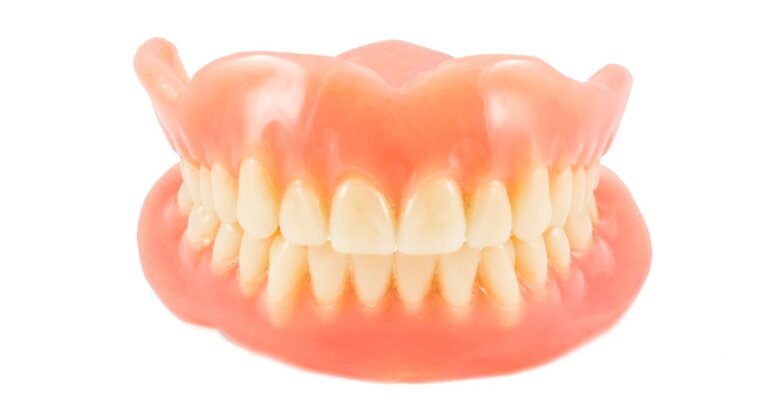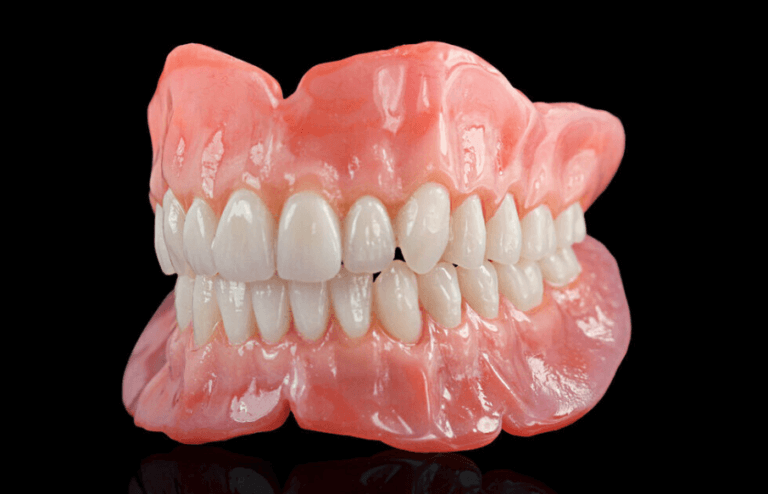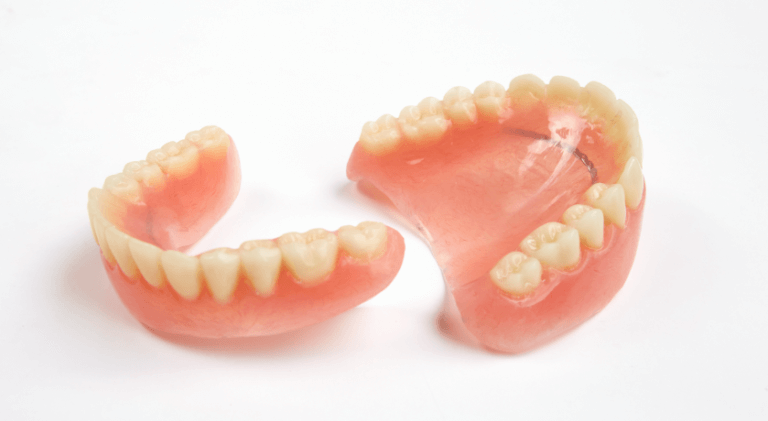Complete Dentures

What Is A Complete Denture?
Complete Dentures come in two main types: conventional dentures and immediate dentures. Conventional dentures are created and fitted after any remaining teeth have been extracted, and the gums have healed, which usually takes a few weeks. On the other hand, immediate dentures are prepared in advance and are inserted immediately after tooth extraction, so you don’t have to be without teeth during the healing process.
Before deciding on whether A Complete Denture are right for you, there are some things you should know:
- Who Needs A Complete Denture?
- Benefits Of A Complete Denture
- Alternative Treatments To Complete Dentures
- How Much Does A Complete Denture Cost?
- Steps In The Complete Denture Procedure
- Frequently Asked Questions About Complete Dentures
If you have any further questions about A Complete Denture or other dental services offered at Atlas Dental, please contact us.

Free Phone Consultation
Have questions about cosmetic dentures for missing teeth? Book a free phone consult with our Toronto dentist

5 star google reviews
Our patients love their cosmetic looking denture smile! See for yourself why patients choose Atlas Dental.

Book a denture appointment online
We make custom fitted dentures to help our patients smile confidently again.
Who Needs A Complete Denture?
Complete dentures are recommended for people who have lost all of their natural teeth in the upper, lower, or both jaws. Common reasons for needing complete dentures include:
- Complete Tooth Loss: When all the teeth in either the upper arch (maxillary) or the lower arch (mandibular) are missing, a complete denture is often the most suitable option to restore the appearance and function of the mouth.
- Severe Periodontal Disease: Advanced gum disease can lead to tooth loss, as the infection weakens the supporting structures of the teeth. In cases where the remaining teeth cannot be saved, complete dentures may be recommended.
- Extensive Tooth Decay: Untreated cavities and dental infections can cause irreparable damage to teeth, leading to tooth loss. In such cases, a complete denture can provide an effective and aesthetic solution.
- Accidental Trauma: Serious accidents or injuries to the mouth may result in the loss of multiple teeth, making complete dentures a viable option for restoring the oral function and appearance.
- Congenital Conditions: Some individuals may be born without certain teeth or with conditions that lead to the absence of teeth. Complete dentures can help in such cases to replace the missing teeth and ensure proper jaw alignment.
- Preparing for Tooth Extraction: In situations where a patient is scheduled to have their remaining teeth extracted, immediate dentures can be prepared in advance to be inserted right after the extractions, providing the patient with immediate tooth replacement during the healing process.
It’s important to consult a dentist or prosthodontist to determine if complete dentures are right for your specific needs. If you have further questions about Complete Dentures, please contact us.
Benefits Of A Complete Denture
Complete dentures offer several benefits for individuals who have lost all their natural teeth:
- Restored Chewing Function: With complete dentures, you can comfortably eat a wide variety of foods, improving digestion and overall health.
- Improved Speech: Missing teeth can affect pronunciation. Complete dentures help restore clear speech, making social interactions easier.
- Enhanced Aesthetics: Dentures restore your smile and facial volume, giving you a more youthful appearance and boosting self-confidence.
- Maintained Facial Structure: Dentures support facial muscles, preventing sagging and preserving your facial appearance.
- Affordable Solution: Compared to alternatives like dental implants, complete dentures are cost-effective.
- Customized Fit: Each denture is custom-made to ensure a comfortable, secure fit with a natural look.
- Immediate Dentures: You don’t have to go without teeth during healing if you choose immediate dentures.
- Non-Invasive Option: Unlike implants, dentures don’t require surgery, making them ideal for patients who cannot undergo surgery.
- Easy Maintenance: Dentures are relatively easy to care for, with routine cleaning and occasional adjustments.
While complete dentures are a great solution for many, they may not be the best choice for everyone. Some patients may prefer implant-supported dentures or other alternatives. If you have further questions about Complete Dentures, please contact us.

Alternative Treatments To A Complete Denture?
While complete dentures offer an effective solution for replacing missing teeth, they may not be the ideal choice for everyone. Here are some common alternative options to consider:
- Immediate Complete Denture: Placed immediately after tooth extraction, providing instant tooth replacement. Adjustments may be needed as gums heal and change shape.
- Tooth Supported Overdenture: Fits over a few remaining natural teeth, offering better stability and jawbone preservation.
- Implant Denture (Implant-Supported Denture): Anchored to dental implants for superior stability, chewing function, and jawbone preservation. These can be fixed or removable.
- Removable Partial Denture: Ideal for replacing several missing teeth, using clasps to attach to remaining natural teeth.
- Dental Bridges: Fixed prosthetics replacing one or more teeth, supported by crowns or implants for a natural look and feel.
Consulting a qualified dentist will help determine the best treatment for your needs, ensuring optimal oral health and function. If you have further questions about Complete Dentures, please contact us.
Cost of Complete Dentures
Dentures can range in cost from $591 to 2053 plus dental lab fee, depending on the type of denture. Example of denture codes found in the Ontario Dental Association’s Suggested Fee Guide appear as follows:
Dentures, Complete, Standard (e.g. Complete Denture)
- 51101 – Maxillary: $1142 + Dental Lab Fee
- 51102 – Mandibular: $1454 + Dental Lab Fee
Dentures, Complete, Provisional (e.g. Immediate Complete Denture)
- 51601 – Maxillary: $591 + Dental Lab Fee
- 51602 – Mandibular: $789 + Dental Lab Fee
Dentures, Complete, Overdentures, Tissue Borne, Supported by Natural Teeth (e.g. Tooth Supported Overdenture)
- 51711 – Maxillary: $1669 + Dental Lab Fee
- 51712 – Mandibular: $2053 + Dental Lab Fee
Dentures, Complete, Overdentures, Tissue Borne, Supported by Implants (e.g. Implant Denture; cost of dental implants not included)
- 51721 – Maxillary: $1669 + Dental Lab Fee
- 51722 – Mandibular: $2053 + Dental Lab Fee
Dentures are sometimes considered a supplementary service by dental insurance plans and may or may not be covered by your dental insurance. Be sure to find out from your dental insurance plan provider how much you are eligible for before going ahead with dental treatment. Your dentist can help you submit an predetermination to your dental insurance. Our fees are consistent with the ODA Fee Guide.
For patients without dental insurance, Atlas Dental is pleased to offer dental financing through iFinance Dentalcard. Affordable payment plans start at 7.95% for terms of 6 months to 6 years. To learn more about Dentalcard dental treatment financing, follow this link.
Steps In The Complete Denture Procedure
Getting complete dentures involves several steps:
- Initial Consultation: Your dentist will evaluate your oral health and discuss your goals for dentures.
- Comprehensive Exam: X-rays and impressions are taken to assess the condition of your gums and jaw.
- Dental Impressions: Accurate impressions are made to create a custom-fit denture.
- Bite Registration: A bite registration records how your teeth align when you bite, ensuring proper fit and function.
- Denture Design and Fabrication: Your denture is custom-made in a dental lab using advanced materials for a natural look.
- Try-In Appointment: You’ll try on your new dentures to assess fit and comfort before any final adjustments.
- Final Fitting and Delivery: Once adjustments are made, your dentures will be ready to wear.
- Follow-Up Appointments: Regular check-ups ensure your dentures continue to fit properly and meet your needs.
Working closely with your dental care team, you can achieve a well-fitting and aesthetically pleasing complete denture that enhances your smile, restores oral function, and improves your overall quality of life. If you have further questions about Complete Dentures, please contact us.

Frequently Asked Questions About Complete Dentures
- How often do dentures need to be replaced?
Complete dentures typically last 5-10 years but may need adjustments or replacement if they become loose or worn.
- What’s the difference between immediate and conventional dentures?
Immediate dentures are placed right after tooth extraction, while conventional dentures are fitted after the gums have healed, which may take weeks.
- Will dentures affect my speech?
You may experience slight speech changes at first, but with practice, your speech will return to normal.
- Can I sleep with my dentures in?
It’s recommended to remove them at night to allow your gums to rest and prevent potential oral health issues.
- Can I eat normally with complete dentures?
Yes, but start with soft foods and gradually reintroduce harder foods as you get used to chewing with your dentures.
If you have any further questions about complete dentures or alternative treatments, don’t hesitate to contact us—our team is here to help you find the best solution for your smile and oral health.

